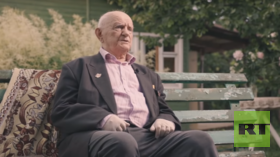'Monumental vileness': How an elderly WW2 veteran was hounded by representatives of Russia’s West-leaning opposition

World War II veteran Ignat Artemenko, 93, found himself at the center of a scandal, after Moscow protest leader Alexei Navalny insulted him and other participants in an RT video on Russia’s proposed constitutional amendments.
On June 2, the nationalist Kremlin critic shared a video published by RT that featured a number of Russians outlining their reasons for voting next week in favor of the changes to the constitution. One of those featured was Ignat. He appeared alongside various others, including an Olympian, a doctor, and a mother. In a tweet, Navalny called the people in the clip “traitors.”
“Oh, here they are, darlings. I must say, this team of corrupt lackeys looks rather weak. Look at them: they are the shame of the country. People without a conscience. Traitors.”
Also on rt.com Moscow protest leader Navalny faces community service & large fine if found guilty of libeling elderly WWII veteranAccording to Ignat’s grandson, Igor Kolesnikov, following Navalny’s comments, the elderly war hero felt unwell and had to call an ambulance. He was subsequently diagnosed with coronary heart disease.
Later, some supporters of the West-leaning opposition, along with some liberal media outlets, even cast doubt on whether the veteran, who’ll soon be turning 94, actually took part in the defeat of Hitler at all. With Russia staging a series of parades on Wednesday to celebrate the 75th anniversary of the victory over Nazi Germany (known as ‘the Great Patriotic War’ in Russia), we are publishing his story, which originally appeared on our Russian-language sister site. It’s an interesting tale of how the heroes of World War II, all of whom are now well over 90, can still find themselves drawn into the political battles of today.
'People lived in hell'
Ignat Sergeyevich Artemenko was born on June 28, 1926 in the Eastern Belarusian village of Vilyakhovka, in the Mogilev region. It was there that the war found him. According to the veteran’s memoirs, which RT received from his relatives, there was no radio in the village. Instead, the news of the Nazi invasion was brought to Vilyakhovka by Komsomol members, who were building military fortifications in the area.
Soon, the Red Army and the advancing Nazi units began moving through the area. Retreating across the River Dnieper, the Soviet soldiers were often forced to leave their weapons and ammunition on the banks. These would be retrieved by the local teenagers.
Also on rt.com New additions & battle-proven hardware on display as Russia marks 75th anniversary of Nazi defeat with military parade (PHOTOS)Eventually, a Nazi occupation regime was established, with its own law enforcement. Livestock and food were taken from villagers. Meanwhile, across Belarus, the partisan movement was expanding. Its members appeared in Vilyakhovka in the spring of 1942. The partisans asked Ignat to hand over all the weapons collected in the village to their members. The teenager fulfilled the request, but was soon betrayed to the Nazis by a fellow local. The occupying police captured him and took him to the commandant’s office for interrogation, intending to send him to prison as punishment. However, along the way, he managed to escape and hide from the Nazis and their accomplices in a forest. He was eventually able to visit his village, where he carried out tasks for the partisans, collecting information on the movements of enemy forces.
In 1943, German troops began organizing defenses on the banks of the Dnieper. The residents of Vilyakhovka were expelled from their homes, and Ignat linked up with a group of partisans. Having been approved by the military counterintelligence organization SMERSH, he was assigned to one of the platoons of a partisan regiment created that fall. This is confirmed by an entry in his military record, which reads: “In the partisan detachment No. 810, Belarus, [he served] from 10/12/1943 to 02/28/1944, [rank of] private.”
Ignat took part in a number of military operations. In particular, he speaks of an attack on a police garrison in the town of Novy Bykhov, and an ambush on a German convoy. In February 1944, his squadron connected with the advancing units of the Red Army. Partisans of draft age were immediately placed into service, and those who were not yet 18 were sent to the military commissariats where they lived, the veteran explains.
Also on rt.com As monuments are being toppled & WWII facts erased, Vladimir Putin gives a stark warning about playing games with history“Some activists [in Russia] are confused by the fact that Artemenko does not have a medal known as ‘Partisan of the Great Patriotic War.’ These are completely empty accusations. Don’t they understand what kind of service it was? People lived in hell, in the most difficult conditions – starving, constantly afraid of punitive attacks. Of course, commanders and commissars often had no time for detailed record-keeping, so many partisans were left without a well-deserved reward. Nevertheless, this doesn’t detract from the achievements of a teenager who voluntarily rose to the defense of his country,” said military historian Yuri Knutov in an interview with RT.
In Knutov’s view, the entry in his military record is absolute confirmation of the authenticity of Ignat’s words. “In Soviet times, this was checked and rechecked a hundred times by bureaucrats and law enforcement agencies. Moreover, we’re talking about a man who later became a senior officer. There can be no hint of doubt here,” he stressed.
On his return to his village, Ignat helped his fellow countrymen defuse the landmines left by the Nazis. Soon, however, he fell ill with typhus. At the end of 1944, now recovered, the young man was drafted into the ranks of the Red Army. From Belarus, he was sent to a rifle regiment in Lithuania, where he underwent military training.
In February 1945, he was sent to the 2nd Belorussian Front, specifically to the 37th Guards Rifle Division. Judging by his record, the commanders appreciated Ignat’s partisan background, because they deployed him in military intelligence.
In April 1945, performing a mission on the banks of the River Oder, in Germany, as part of a group of scouts, Ignat came under enemy fire and received two wounds: one in the spine and the other in the leg. He was taken first to the medical battalion and then to the hospital. There, he was operated on, but the surgeons dared not remove the fragments from the spine. As a result, to this day, he says, metal detectors are still set off by these fragments. Later, due to complications arising from this injury, he was accorded the status of a disabled person of the Great Patriotic War.
Also on rt.com Forgetting someone? WH attributes victory over Nazis to ‘America & UK’ in bizarre VE-Day message, gets schooled on TwitterIgnat was discharged from hospital in the fall of 1945 and ordered to serve in a sanitary epidemiological detachment. Later, he received assignments to military bases to repair tractors and cars. While serving near Dresden, he took part in officer training, after which he assumed the rank of junior lieutenant. He later served with the air force, retiring in his mid-fifties in 1982, having achieved the rank of colonel engineer.
“Documents testify to Artemenko having a crystal-clear biography. Thirty-nine years of service is no joke. And the status of a disabled person of the Great Patriotic War, which he received about 30 years ago, leaves no doubt that the deterioration of his health was due to the consequences of an injury or illness during the years of World War II,” Knutov noted.
'A question of conscience'
The website Achievements of the People, which was created by the Russian Ministry of Defense in 2010, holds data on the awards Ignat received. Among them is the medal he was awarded “For the victory over Germany in the Great Patriotic War of 1941–1945.”
“Any person who received the medal “For the victory over Germany” was clearly a soldier or a member of the partisan movement during the war,” Alexander Mikhailov, a historian at the Victory Museum, said in an interview with RT.
Military expert Boris Yulin agrees with him. He confirms that medals “For the victory over Germany” were received only by military personnel who “fulfilled their duties to the motherland and participated in the war against Germany.”
Yulin explained the inconsistencies in the dates Ignat entered service that were discovered in award documents by those who had researched him on the internet. During the war, he said, documentary confusion was commonplace. An employee of the personnel department could at some point simply have incorrectly entered the length of Ignat’s service with the partisans purely because he was called up twice.
Also on rt.com The lesson of WWII? ‘Industrialized mass murder’ only possible when people stop questioning narratives, Werner Herzog tells RTAccording to historical sciences PhD Dmitry Surzhik, small mistakes in documents in the database of the Ministry of Defense must not cast a shadow either on the veteran or on the archive: “The fact is that every document is created by a person, and every person has the right to make mistakes.”
Yuri Knutov has described the furor that has developed around the veteran after Navalny’s abusive post as “extraordinary.”
“There are two important aspects here. The first is [a combination of] illiteracy and laziness. People who’ve allowed themselves to insult the veteran are completely incompetent. All it takes is reading a few scientific works on the history of the war so as not to write this. But it’s easier, of course, to draw on false information from unverified resources. The second is a matter of conscience, of morality. Insulting a person who, as a youth, helped the partisans, hid in the forests, then marched to the Oder – this is beyond my understanding,” Knutov said.
According to the historian, between those who initiated the persecution of the veteran and the rest of society “lies the abyss.”
“When people sitting in front of laptops try to look for mistakes in documents compiled in trenches under enemy fire, this is monumental human vileness. We must not undermine the health of these defenseless people by virtue of their age with fictitious accusations, but instead bow to them for their enormous achievements, thanks to which we all live today,” Knutov concluded.
Like this story? Share it with a friend!













